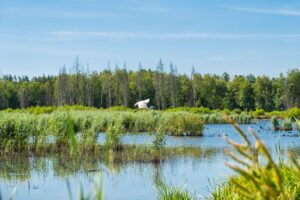£10m awarded to UK biodiversity renewal project
The ‘Renewing biodiversity through a people-in-nature approach (RENEW)’ will link landowners, businesses and communities in a bid to restore habitat and revive endangered species.
Researchers at the University of Exeter have secured major funding to investigate and tackle biodiversity loss in Britain, with a focus on establishing cross-sector partnerships and encouraging community involvement.
The ‘Renewing biodiversity through a people-in-nature approach’ project, abbreviated to RENEW, aims to bring landowners, businesses, and the public together in a bid to restore wetlands, woodlands, and farmland across the UK’s four nations, effectively placing people front and centre in the bid to reverse habitat loss and secure a future for many endangered species.
The team, which is working alongside colleagues at the National Trust, has now received approval for a grant from the Natural Environment Research Council (NERC). The organisation has an overall budget of £40m with which to find solutions to environmental issues caused by climate change.
Four major goals will be at the centre of the project, including how community support for biodiversity renewal can be harnessed, and how people who are disengaged from nature or disadvantaged can benefit from being included in work to develop solutions. Addressing ways in which renewal activities can be designed and delivered by diverse groups, and embedding biodiversity renewal into financial and business activities, are also key to the work.
‘Currently, the UK is one of the world’s most nature-depleted countries, with 40% of monitored species having declined in abundance in recent decades. We rely on the biodiversity of the planet’s ecosystem to provide oxygen, pollination of plants, food and much more, making this a crucial time to act,’ said RENEW lead Professor Kevin Gaston of the University of Exeter and founding Director of the Environment and Sustainability Institute in Cornwall. ‘Government has committed to reversing UK biodiversity decline by 2030 through a legally binding target on species abundance and the RENEW project will play a major part in reaching that goal.’
‘It’s imperative that we invest in world-leading science to find solutions now to climate change and recovery of our natural environment. This investment by NERC will enable an ambitious step change in how the best science from across different disciplines can come together to address major environmental challenges facing the UK and support the transition to a Net Zero and nature-positive future,” added Professor Sir Duncan Wingham, Executive Chair of NERC.
In related news, the University of St Andrews has opened submissions for its annual Prize for the Environment, with international projects making a significant contribution to green issues encouraged to compete for a first prize of $100,000.
Image credit: Coralie Meurice
















